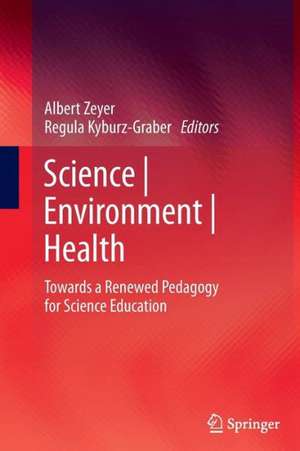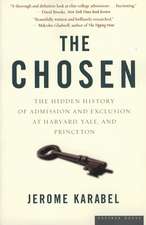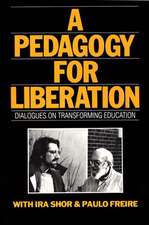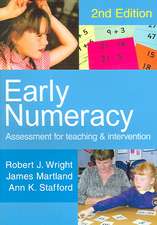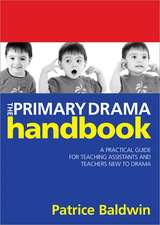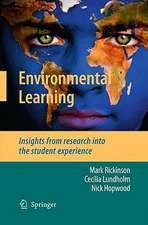Science | Environment | Health: Towards a Renewed Pedagogy for Science Education
Editat de Albert Zeyer, Regula Kyburz-Graberen Limba Engleză Paperback – 12 iun 2014
This book contains a selection of papers from prominent professionals in science, health and environmental education, who reflect on science education, each from their specific point of view. The core idea is to present well-founded perspectives on how science education may benefit from challenges stemming from both health and environmental education.
Specific reasons are discussed as to why these two areas are particularly legitimized to challenge science education, and their potential impact on a revision of science education is evaluated.
A new pedagogy for science¦environment¦health that yields interesting and relevant science education for students and teachers, and addresses the grand challenges of this century: what an attractive and rewarding project! The book will motivate teachers, teacher educators and science education researchers to take part in this on-going project.
| Toate formatele și edițiile | Preț | Express |
|---|---|---|
| Paperback (2) | 635.80 lei 6-8 săpt. | |
| SPRINGER NETHERLANDS – 12 iun 2014 | 635.80 lei 6-8 săpt. | |
| Springer International Publishing – 11 dec 2022 | 640.55 lei 6-8 săpt. | |
| Hardback (2) | 640.06 lei 6-8 săpt. | |
| SPRINGER NETHERLANDS – 25 mai 2012 | 640.06 lei 6-8 săpt. | |
| Springer International Publishing – 11 dec 2021 | 787.29 lei 6-8 săpt. |
Preț: 635.80 lei
Preț vechi: 748.00 lei
-15% Nou
Puncte Express: 954
Preț estimativ în valută:
121.67€ • 126.87$ • 101.12£
121.67€ • 126.87$ • 101.12£
Carte tipărită la comandă
Livrare economică 20 martie-03 aprilie
Preluare comenzi: 021 569.72.76
Specificații
ISBN-13: 9789400793798
ISBN-10: 9400793790
Pagini: 204
Ilustrații: VI, 197 p. 15 illus.
Dimensiuni: 155 x 235 x 11 mm
Greutate: 0.29 kg
Ediția:2012
Editura: SPRINGER NETHERLANDS
Colecția Springer
Locul publicării:Dordrecht, Netherlands
ISBN-10: 9400793790
Pagini: 204
Ilustrații: VI, 197 p. 15 illus.
Dimensiuni: 155 x 235 x 11 mm
Greutate: 0.29 kg
Ediția:2012
Editura: SPRINGER NETHERLANDS
Colecția Springer
Locul publicării:Dordrecht, Netherlands
Public țintă
ResearchCuprins
1. Introduction, Albert Zeyer, Regula Kyburz-Graber.- Part I: Challenges of Health and Environment Education to Science Education.- 2. Preparing citizens for a complex world: The grand challenge of teaching socio-scientific issues in science education, Peter J. Fensham.- 3. Socio-scientific Views on Environment and Health as Challenges to Science Education (Regula Kyburz-Graber).- Vignette 3: DINOS: Discussing the Nature of Science – A video-based research study on the process and content of students‘ small-group discussions in specific learning arrangements, Balz Wolfensberger, Claudia Canella, Jolanda Piniel, Regula Kyburz-Graber.- 4. Scientific Literacy in Environmental and Health Education, Rodger W. Bybee.- 5. The Concept of Health Literacy, Peter J. Schulz, Kent Nakamoto.- Part II: Responding to Challenges of Health and Environmental Education.- 6. Science, environment and health education: towards a reconceptualisation of their mutual interdependences, Justin Dillon.- 7. Creating Spaces for Rethinking School Science: Perspectives from Subjective and Social-Relational ways of Knowing, Paul Hart.- 8. General and Environmental Health as the Context for Science Education, Alla Keselman, Savreen Hundal, Catherine Arnott Smith.- 9. A win-win situation for health and science education: Seeing through the lens of a new framework model of health literacy, A. Zeyer.- Vignette 1: X-ray photographs in the classroom, Toni Müller, Albert Zeyer.- Vignette 2: kidsINNscience. Innovation in Science Education – Turning Kids on to Science, Christine Gerloff, Karin Büchel.- 10. Concluding chapter: Revising science teaching: Responding to challenges of health and environmental education, Albert Zeyer, Regula Kyburz-Graber.
Textul de pe ultima copertă
Health and the environment are important learning areas in science education and their significance is growing. Not only do they have high social relevance, but they are also close to students’ interests and needs. They provide many opportunities to unlock science with questions that are personally relevant to boys and girls and that inspire them to engage in science.
This book contains a selection of papers from prominent professionals in science, health and environmental education, who reflect on science education, each from their specific point of view. The core idea is to present well-founded perspectives on how science education may benefit from challenges stemming from both health and environmental education.
Specific reasons are discussed as to why these two areas are particularly legitimized to challenge science education, and their potential impact on a revision of science education is evaluated.
A new pedagogy for science¦environment¦health that yields interesting and relevant science education for students and teachers, and addresses the grand challenges of this century: what an attractive and rewarding project! The book will motivate teachers, teacher educators and science education researchers to take part in this on-going project.
This book contains a selection of papers from prominent professionals in science, health and environmental education, who reflect on science education, each from their specific point of view. The core idea is to present well-founded perspectives on how science education may benefit from challenges stemming from both health and environmental education.
Specific reasons are discussed as to why these two areas are particularly legitimized to challenge science education, and their potential impact on a revision of science education is evaluated.
A new pedagogy for science¦environment¦health that yields interesting and relevant science education for students and teachers, and addresses the grand challenges of this century: what an attractive and rewarding project! The book will motivate teachers, teacher educators and science education researchers to take part in this on-going project.
Caracteristici
Describes the mutual benefit of three critical and inter-linked areas of education - science, environment, health Provides a state of the art account of a renewed pedagogy of science Today's grand challenges of health and environment are addressed from various perspectives of informed citizenry
Notă biografică
Albert Zeyer, Dr. med. et dipl. math., is a mathematical physicist and physician. After working as a science teacher and a children’s doctor in Swiss schools and hospitals, he was a senior researcher at the Institute of Education of the University of Zurich. He then became a professor of medicine at the Institute of Health Professions of the University of Applied Sciences Bern. Currently, he is professor of science education and head of science teacher education at the University of Teacher Education Lucerne, Switzerland. His research interests are the transdisciplinary dialogue of science, health and environmental education, and public understanding of science.
Regula Kyburz-Graber, Dr. sc. nat., Professor of Education for secondary school teachers at University of Zurich, Switzerland, 1998-2014. After her studies at ETH in Zurich she was a teacher for Biology in pre-academic classes and she founded research groups in environmental education projects. As professor at University of Zurich she was leader of various cooperative research projects with teachers in national and international contexts. Her research interests are environmental education/education for sustainable development, science education, science at the interface of nature and society, cross-curricular teaching and learning, reflective teaching, and self-regulated learning.
Regula Kyburz-Graber, Dr. sc. nat., Professor of Education for secondary school teachers at University of Zurich, Switzerland, 1998-2014. After her studies at ETH in Zurich she was a teacher for Biology in pre-academic classes and she founded research groups in environmental education projects. As professor at University of Zurich she was leader of various cooperative research projects with teachers in national and international contexts. Her research interests are environmental education/education for sustainable development, science education, science at the interface of nature and society, cross-curricular teaching and learning, reflective teaching, and self-regulated learning.
